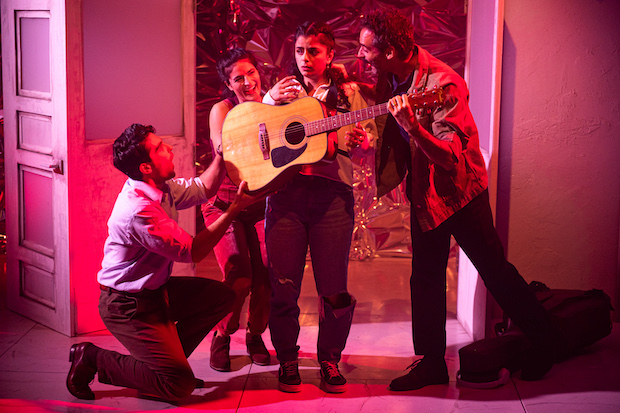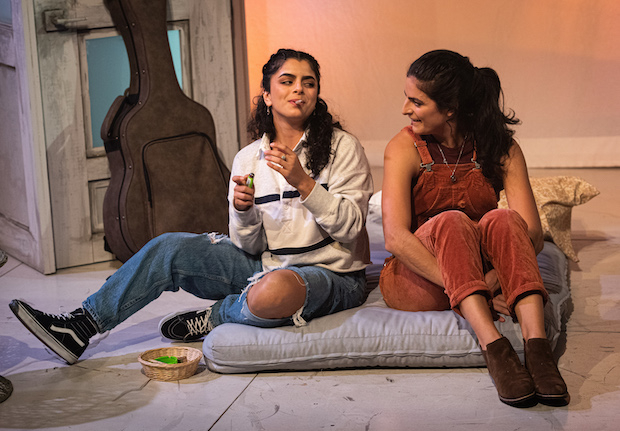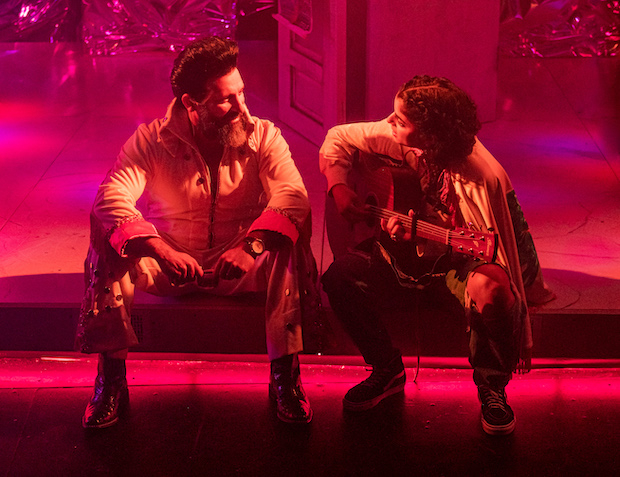Review: Hound Dog and the Meaning of Elvis for One Turkish Family
Ars Nova and PlayCo present the world premiere of Melis Aker’s musical play.

(© Ben Arons)
American elites tend to aim a fashionably upturned nose at our own cultural heritage. We stumble over ourselves to list the ways any artist embraced by the masses is problematic: Elvis Presley appropriated Black music and, through the dark wizardry of capitalism, made white record executives very rich. All of this is true, but does it negate the joy that music has brought to listeners? It certainly discounts how our problematic culture can be received as liberation in foreign lands suffering under legitimately repressive regimes.
This conflict between fancy American manners and global liberal aspirations emerges sharply in the opening scene of Melis Aker's HOUND DOG (the production inexplicably insists the title be in all-caps, a directive I will henceforth ignore). It is now making its world premiere at Greenwich House in a co-production of Ars Nova and PlayCo. The protagonist (who is called "Hound Dog" in the program and "Me" in the script, and is played by Ellena Eshraghi) criticizes her Elvis-worshiping father (Laith Nakli) for consuming music that is the product of "appropriation" and "commercial simplicity."
"BLAAH BLAAH BLAAAAH — you're such a lemon, Harvard," retorts her friend Ayse (Olivia AbiAssi), a queer woman living In Ankara. When Hound Dog (who graduated from Harvard with a degree in musicology, but has now returned to her native Turkey) accuses her friend of not passing the "Bechdel Test", Ayse responds, "Bro I don't need some Mechdel test, okay, can't say this, can't say that, got enough o' that shit over here." The friction between their different perspectives is dramatically compelling.

(© Ben Arons)
Having produced a great hook, Aker fails to develop a satisfying melody over the following 95 minutes of this kind-of musical, with dreamy, instantly forgettable songs co-written by Aker and the Lazours. None of the musical numbers do much to further the storytelling. Suddenly appearing onstage with a guitar, Sahar Milani sings all of them accompanied by Ashley Baier (drums), Mel Hsu (bass), and Maya Sharpe (guitar). This band occupies a kind of alternate reality, but their relationship to Hound Dog and her story is never particularly clear.
What we can gather from the plot arrives in a series of disjointed scenes, some of which attempt to capture the world as it appears when you're high on marijuana: Hound Dog has an awkward encounter with her American music teacher (Matt Magnusson). She befriends Yusuf (Jonathan Raviv), a local clarinetist and sanitation worker. She feels guilt about missing her mother's funeral for an audition. She watches the silhouette of her father guzzle whiskey in an upstairs window. Dad has been acting increasingly erratic since his wife died, spending hours locked in his room and sewing a shiny pink garment. I briefly wondered, Is dad transitioning? And indeed he is — into Elvis Presley.
This kind of stream-of-consciousness fantasy can be thrilling when presented with rigor and inventive theatricality. Unfortunately, director Machel Ross never quite convinces us to surrender ourselves to her storytelling the way directors have for previously daring Ars Nova musical projects like Oratorio for Living Things, Rags Parkland, and The Great Comet.
Some of that comes from a haphazard application of the rules of the play: Hound Dog wants us to know that its characters are Turkish by having everyone speak in a baseline American dialect. Only when they are speaking English do they betray any hint of an accent. At least, this is how it is supposed to go, but this convention is never followed as scrupulously as it was in last season's English.
There are other tells in the staging and design: Dad wears flared white pants during a flashback to 1979 (costume designer Qween Jean does a marvelous job capturing the delightful appropriation and remixing of American style as it travels across borders). But he also wears them in the scene immediately preceding that one, which is set in the early 2000s. We know why: Not enough time in the quick-change. Similarly, the actors struggle with the large shutters on Frank J. Oliva's set, which re-creates the front of an old Turkish house and occupies the width of the theater, pushing the actors onto a narrow strip of playing space between the facade and the audience. A scene that is meant to reveal the band in their mystical musical dimension mostly leaves us confused and wondering about the purpose of the massive amount of foil decorating the interior.

(© Ben Arons)
The actors do their best to deliver emotionally lucid performances amid the chaos, with Nakli giving a particularly impactful portrayal of an older Turkish liberal disenchanted with the failed promise of the Republic, but who still maintains a puckish rocker spirit. AbiAssi, Magnusson, and Raviv deftly navigate multiple roles, working hard to turn the flow of Hound Dog's imagination into a physical reality. They are intermittently successful.
There's just so much you can do with a script that still reads like a work-in-progress. Aker likely has several more drafts to go through before Hound Dog has a clear narrative thrust that sweeps the audience up in its weirdness and doesn't allow us escape into our own brains, where we inevitable start constructing calendars and shopping lists (as I caught myself doing multiple times here).
Little moments of insight brought me back: Hound Dog celebrates how the song of America becomes beautifully distorted as our cultural megaphone blares across the seas. It makes the audience feel the heavy expectations weighing on anyone fortunate enough to obtain an F-1 visa (especially to attend Harvard). It shows how people find freedom in the most unexpected places. Hound Dog has something to say about all of this, but the language is muddled, like rock lyrics struggling to be heard over the music.









